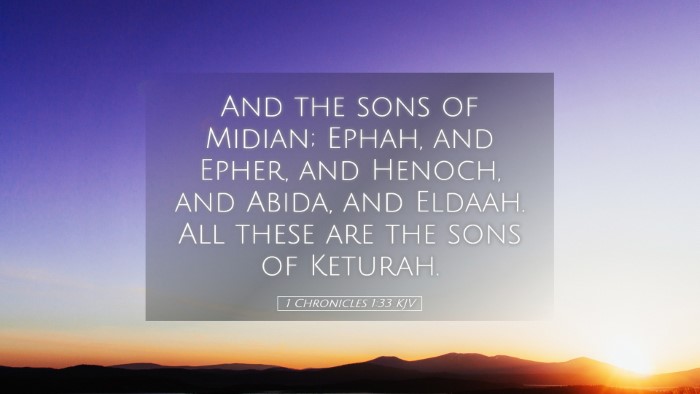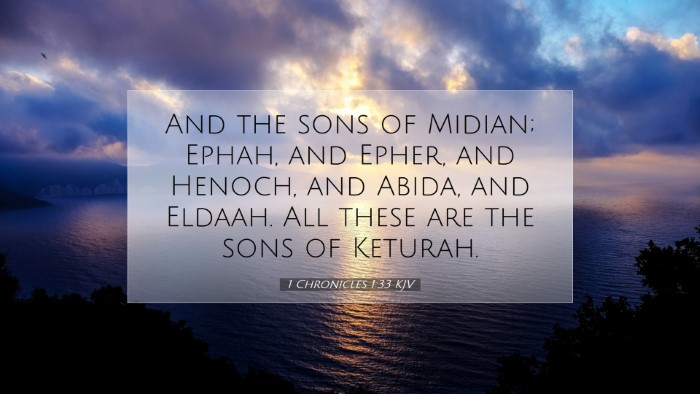Commentary on 1 Chronicles 1:33
Verse: 1 Chronicles 1:33 - "And the sons of Heman: Bedeiah, the firstborn; then, the second, Jeush; the third, Shemei; the fourth, Jachin."
Contextual Overview
This verse is part of the genealogical record found in the first chapter of 1 Chronicles, which serves to trace the lineage of the tribes of Israel. The information presented in this chapter emphasizes the importance of family lineage and the role of musical families, especially in the context of worship. The genealogies in Chronicles exhibit a strong emphasis on God's covenant with His people, showcasing His faithfulness through generations.
Insights from Public Domain Commentaries
Matthew Henry's Commentary
Matthew Henry notes that the chronicler's intent in listing genealogies is not merely to preserve history but to underscore the significance of each name in relation to the Divine purpose. Each person mentioned achieved a specific role in the religious and cultural life of Israel. Regarding Heman, he was recognized as one of the key musicians in David's court, and his descendants were particularly esteemed. The verses following this one detail his capabilities: they were 'instruments used in the service of the Lord.' It is important to understand that their musical prowess was a part of their priestly duties, signifying that worship and service were intertwined.
Albert Barnes' Notes
Albert Barnes emphasizes the view of Heman as a prominent figure in the Levitical order, a lineage from the tribe of Levi entrusted with sacred tasks. He introduces the significance of the names given to Heman’s sons, indicating the characteristics or traits that may have defined them. Barnes suggests that the firstborn, Bedeiah, signifies reliance on God ('Bedeiah' can mean 'son of God'), which resonates deeply within Israel's understanding of their own identity. This name conveys a theological truth about dependency and divine assistance, essential traits in a leader's family.
Adam Clarke's Commentary
Adam Clarke further delves into the historical aspect of Heman’s descendants. He points out that Heman was not merely a musician but also a prophet, which was a rare combination. Heman's sons—Bedeiah, Jeush, Shemei, and Jachin—are viewed as inheritors of a sacred tradition, tying back into the prophetic and musical lineage. Clarke connects the names to their possible etymological meanings, framing them within the religious culture. For instance, 'Jeush' is interpreted as joy, highlighting the celebratory nature of worship. The verse illustrates the variety in character and strength that Heman's family contributed, establishing them as significant figures within Israel's worship-centric society.
Theological Implications
The genealogy listed in 1 Chronicles 1:33 provides rich theological implications for both contemporary readers and scholars. Firstly, it reaffirms God's promise to His people, illustrating how generations fulfill divine purposes. By tracing lineage, we see God’s faithfulness in maintaining a remnant for worship. Additionally, the passage underscores the importance of communal worship within the life of Israel; the musicianship showcased here was integral to the cultural, spiritual, and communal identity of the nation.
Practical Applications
- Valuing Heritage: Recognizing our spiritual heritage and the roles that family and tradition play in shaping our faith journey.
- Service in Worship: Understanding that worship is not just an individual act but a communal effort that involves various gifts and skills.
- Importance of Names: Reflecting on how names carry significance in character and calling; exploring the meaning of our own names in spiritual contexts.
- Encouragement for Future Generations: Cultivating an environment where the next generation can thrive in their worship and service, seeking to inspire and equip them.
Concluding Thoughts
1 Chronicles 1:33, while seemingly a simple genealogical entry, reverberates with profound themes of legacy, divine purpose, and the integral role of worship. The insights from these public domain commentaries invite pastors, students, and theologians to reflect on their own spiritual foundations and the broader implications of their service to God. The continued exploration of these genealogies enhances our understanding of God’s sovereign plan and propels us toward a deeper commitment to worship and service in our own communities.


